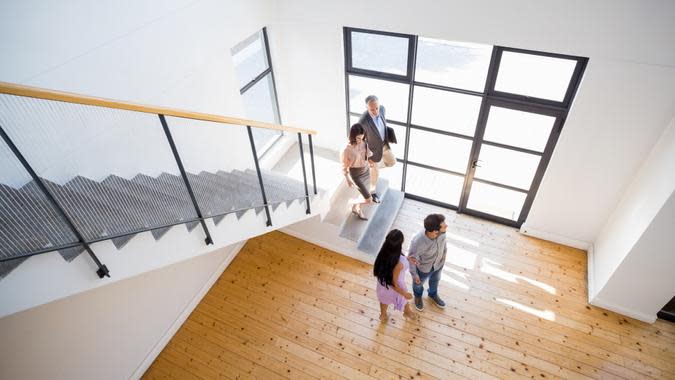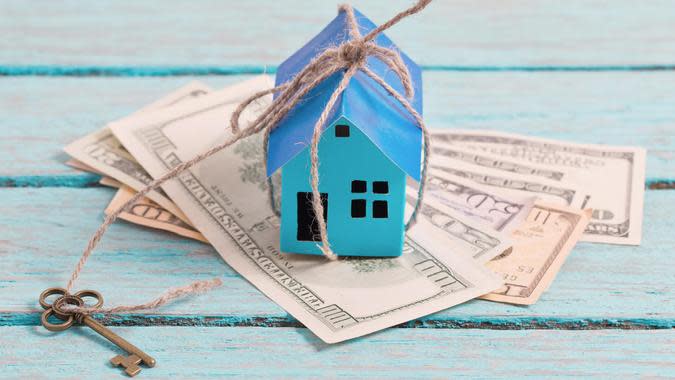The Pros and Cons of Going Back to Renting After Owning

Across the country, homeowners are considering doing something that traditionally might have been seen as taking a step back — they’re thinking about going back to renting. Some are retirees looking to downsize. Others are newly minted telecommuters who want to move to their dream city now that they can work from anywhere. Others are hoping to take advantage of a red-hot housing market and sell at a profit while prices are still sky-high.
More: The Housing Market Forecast for the Rest of 2021, According To Realtors
Read: 10 US Cities Spending Big Money on New Housing Construction
No matter the reason, homeowners have a lot to consider before they go back to cutting a check to a landlord every month. Renting comes with a few significant drawbacks — but a few key benefits, as well.
Last updated: Sept. 3, 2021

Pro: Renting Lets You Sell Without Buying
One group of homeowners who might benefit from downshifting back to renting are those looking to sell while prices are still high.
“If you are in an area — like most parts of the country right now — where homes are selling quickly and there are more buyers than homes available for sale, then it is a good time to sell,” said Bill Samuel, a full-time Chicago-area residential real estate developer and founder of Blue Ladder Development.
The problem is, you would then have to buy a house in the same high-priced market — unless you rented out the storm.
“Finding a new home to move into is going to be challenging, so if you are able to rent for a little while, that can help alleviate a lot of the timeline pressure to find a new home,” Samuel said.
From Alabama to Wyoming: The Cost of Living Across America

Con: Renting at a Discount Is Hardly a Guarantee
The problem with trying to wait out the bubble in a rental is that when inventory is tight and prices are high in the housing market, the rental market tends to follow suit.
“The biggest drops in rent were in big coastal cities such as New York and San Francisco,” said Chris Motola of Merchant Maverick. “If you're in Austin, on the other hand, you'd be trying to wait out a housing boom by jumping into a very competitive rental market.”
Helpful: These Are the 50 Best Cities for Renters

Pro: Renting Can Give Buyers a Competitive Edge, Too
The hot housing market has created stiff competition among buyers looking for any competitive advantage in bidding wars. Renting before you buy can make your offer more attractive to sellers and tip the scales in your favor.
“If you are renting, you will also be able to provide a more competitive offer on a house you want to purchase as you won't have to worry about convincing a seller to accept your additional contingency of selling your current house,” Samuel said.
Read: The Salary You Need To Afford Rent in Every State

Con: You Don’t Build Equity
When you own a home, part of your monthly payment goes to building equity — the difference between the home’s value and the amount you owe on the loan. While homeowners build equity by paying down their mortgage, they get a second helping of equity for free in the form of appreciation. Rent payments, on the other hand, pay down someone else’s mortgage and provides them with passive income. In short, homeowners build wealth for themselves with each monthly payment. Renters build it for someone else.
Find Out: These Are the 50 Best Cities for Gen Z To Live Well on a Budget

Pro: Renting Can Be a Hedge for Housing Market Pessimists
Right now, homeowners are watching their property values climb to new highs every few months — but the next down cycle is always just around the corner. For anyone who thinks the hot market is actually a bubble that’s bound to pop sooner or later, it might make sense to sell and rent while the getting-out is good.
“When it comes to comparing the value of renting vs. owning, you can sort of think of renting as a hedge against the housing market,” Motola said. “Home equity is worth the most when the value of your home is outpacing inflation. If you're expecting a hard landing for the housing market in the short term, it may make sense to rent.”
See: 40 Cities That Could Be Poised For a Housing Crisis

Con: Your Rent Is Always Going Up
If you take out a fixed-rate mortgage, your rate and repayment schedule are locked in for the life of the loan. Your property taxes and homeowners insurances rates are sure to rise over time, which makes your monthly payment tick up, but the monthly cost of owning your property stays the same. Renters, on the other hand, should expect their landlords to raise their rents after every lease term expires unless they live in a city that forbids it, according to Rent.com.
Read: 30 Hot Real Estate Markets Where Homes Are Going Fast

Pro: For Renters, the Big Headaches Are Someone Else’s Problem
Perhaps the greatest benefit of renting is peace of mind. For renters, the broken pipes, insect infestations and burned-out sump pumps that bleed so many homeowners of their savings and security are solved with a call to the landlord.
“While renting is expensive and doesn't build up equity, remember that renters aren't directly responsible for maintenance and repairs,” Motola said.
Is Yours on the List? 50 Cities With the Most Overpriced Homes

Con: You Lose the Asset
When you sell your home, you cash out your equity and lose the asset that equity represents. Homeowners can borrow against the equity that they build over time in the form of home equity loans, home equity lines of credit, reverse mortgages and cash-out refis. Homes represent security to lenders — something that makes a borrower less risky. For renters coming off of a sale, cash is now their asset — and unlike a home, cash is not an appreciating asset.
Find Out: The Cost To Own a 3-Bedroom Home in Every State

Pro: It’s Much Harder To Get Stuck in a Rental
Finally, renting is far more flexible than homeownership for anyone who might have to relocate. This is true even in the case of long-term leases. Maybe you’re moving for a work relocation or because your family is growing out of the house you’re in now. Either way, you’re much more likely to get stuck in a house that you can’t sell than you are to get stuck in a rental lease you can’t break. This is especially true during a down economy or if you’re trying to leave a neighborhood in decline.
“It tends to be easier to leave a lease than it does to sell a home during a bear market,” Motola said.
Find Out: The Best Place To Buy a Home in Every State

Con: You Lose the Many Tax Benefits of Homeownership
When you sell your house, you’ll notice that you no longer have a whole bunch of tax breaks that you might have taken for granted during all those years of owning a home. Homeowners can deduct mortgage interest and property taxes — they can even deduct up to $500,000 in profit from selling a home, depending on their filing status. Renters, on the other hand, can expect no tax breaks unless they live in a state with a renter’s tax credit, according to Rent.com.
More From GOBankingRates
What Money Topics Do You Want Covered: Ask the Financially Savvy Female
Here’s How Much You Need To Earn To Be ‘Rich’ in Every State
This article originally appeared on GOBankingRates.com: The Pros and Cons of Going Back to Renting After Owning

 Yahoo Finance
Yahoo Finance 